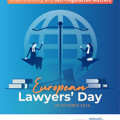The importance of an independent legal profession
Former President of the Law Society of Scotland Ken Dalling, who was elected as Head of the UK Delegation to the Council of Bars and Law Societies of Europe in April this year, considers the importance of an independent legal profession and how separation from the state is intrinsically linked to the health of a democratic society on European Lawyers Day 2024.
Synchronicity, or coincidence, often gets a bad reputation. Reading a meaningful connection between two seemingly unrelated events can be seen as insightful or simply bonkers.
I have often taken comfort in the commonality of views exchanged in the robing rooms of the Sheriff courts in which I find myself. How reassuring when others, whose experiences are informed by the many variations in the lives of their clients, share a view on how things should work and what is and is not important. It could be said - though not by me - that solicitors are, even today, drawn from a section of society which starts with a common world view.
I am more inclined to think that in seeking to understand and resolve transactional as well as dispute related problems with which clients present us, we come to an understanding of human nature and the general order of things. We come to our assessment through experience not preconception.
So too, when navigating the law and the courts a solicitor will identify for themselves practices and arrangements which work well and others which are, at best sub-optimal.
The regulation of legal services in Scotland remains a live issue for the Scottish Parliament with the government taking additional time to decide what exactly the future regulatory model should look like. It does seem that the Equalities, Human Rights and Civil Justice committee will take on board the observations not only of the Law Society and Faculty of Advocates but also by the Senators and by Esther Roberton herself that a government appointed regulator is not a good idea. But how interesting that the theme of the Council of Bars and Law Societies of Europe European Lawyers Day 2024 is “Independent lawyers, stronger democracies: why self regulation matters”.
Accepting that the current Scottish model of regulation is actually one of joint regulation with the courts under the authority of the Lord President and incorporates high level input from those outwith the legal sector entirely, does not detract from the message.
Professional bodies have the ability to govern their members in a manner that ensures that they are not subject to undue influence from the state or other external pressures. They apply appropriate, proportionate regulation in the public interest by those who know and care most about the outcome - including many lay people who contribute to the process at no cost. In defining professional standards, including those for access to the profession, and upholding them through disciplinary measures, this form of regulation allows those who are regulated both to have confidence in the system and to be encouraged to comply with it.
Regulatory independence from government is a prerequisite to the proper defence and representation of clients across the legal disciplines, and through professional investigatory and disciplinary processes guarantees a quality service to clients with appropriate redress when that isn’t provided.
Separation from the state is intrinsically linked to the health of a democratic society. It is essential for confidence not only in the justice system but the systems which determine transactional interaction. I am confident that this view, broadly shared within the legal profession of Scotland, the wider UK, Europe and beyond has been arrived at by lived experience and the evidence taken from that.

European Lawyers Day 2024
European Lawyers Day celebrates the common values of lawyers and their intrinsic role in the defence and promotion the rule of law, as well as their contribution to the justice system.

